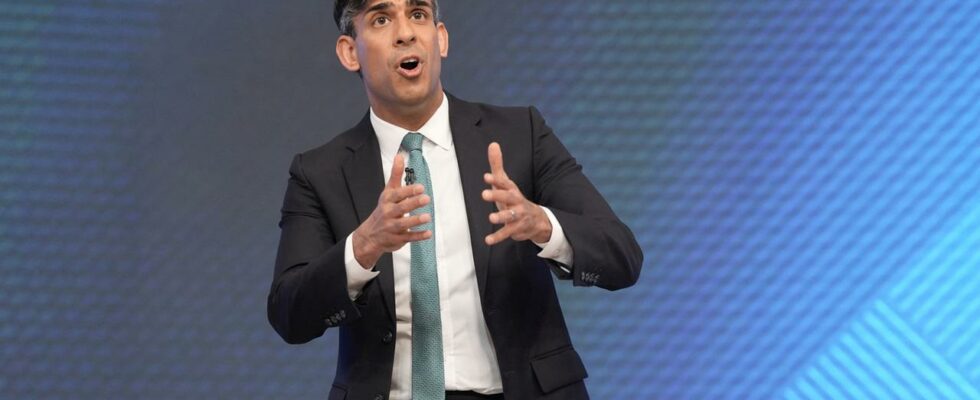analysis
At the halfway point of the election campaign in the United Kingdom, the conservative Tories are in third place for the first time, according to polls: behind Labour – and the right-wing populists around Nigel Farage. Are they now threatened with extinction?
Actually, the election campaign in the United Kingdom is a bit boring.
Labour has been ahead for weeks, ever since Conservative Prime Minister Rishi Sunak called the election, standing in the rain at the lectern in front of Number 10 Downing Street. The water dripped down on him – he provided a sad picture of the state of the Conservatives.
“Turning point has been reached”
Yesterday, The Times newspaper published a poll in which the Tories are now in third place for the first time, behind Labour and behind Reform UK, the right-wing extremist in British politics.
The enfant terrible of British politics, Nigel Farage, is the leader of the far-right party and is now running for a seat in the House of Commons.
After it became known that Reform UK is currently in second place, he quickly called a press conference yesterday. Now the time has come, the signal should be: “We are very pleased to see that the turning point has now been reached.”
Farage wants Opposition leader become
Farage is driving the Conservatives ahead of him – once again. Previously with the issue of Brexit, now migration is his most important issue, fuelled by great dissatisfaction among many voters.
And he has big plans: Farage wants to become opposition leader. “Starmer will have a huge majority, even though he has no plan. He doesn’t even mention illegal migration in his priorities,” said Farage about the leader of the Labour Party. He now wants to become the voice of the opposition in parliament and in the country.
This is unlikely to work, as the British electoral system ensures that the strongest candidate wins in each constituency. Reform UK could therefore achieve 19 percent but only win a few constituencies, or perhaps no constituencies at all. Labour in particular should benefit from this.
Conservatives are desperate
That makes this election campaign quite exciting. Are the Conservatives not only facing a veritable defeat but even extinction?
Within the Conservative Party, MPs tell each other the story of 1993. At that time, the Conservatives in Canada suffered a terrible defeat and slipped from the governing party down to two seats.
The British Conservatives are so desperate that Defense Secretary Grant Shapps advocated voting Conservative so that there would be a proper opposition that could control the government.
“This country does not work well when we have majorities like those we had under Tony Blair – or even bigger. There are many hard-working Conservative MPs who should be controlling the government,” Shapps said.
One third of Labour’s seats
In 1997, 418 Labour MPs entered the House of Commons under the newly elected Prime Minister Tony Blair, while the Conservatives had just 165.
In the polls and calculations for the July 4 elections, the polling institute YouGov estimates 422 seats for Labour and 140 for the Conservatives.
This would mean they would have 225 fewer seats than after the 2019 election. But if Reform UK continues to gain ground, this prediction could shift even further.
Labour is betting on “change” after “chaos”
Meanwhile, Rishi Sunak is trying to make promises: there will be tax cuts. He accuses Labour of even wanting to raise taxes, for which there is no evidence.
Labour leader Keir Starmer is banking on change: “Change” after 14 years of chaos, as he describes the Conservatives’ time in government because of Brexit, Partygate and a Prime Minister Liz Truss who sent the financial markets into a tailspin before she was deposed after just a few days in office.
But Starmer’s “change” is far from generating enthusiasm. Many Britons are fed up with politics and have lost trust, according to a survey by the National Centre for Social Research.
45 percent of respondents said they would never trust the government to put the needs of the nation above their own – regardless of which party the politicians belong to.
It is a result of Brexit, unfulfilled promises, mediocre economic development and the turmoil surrounding former Prime Ministers Boris Johnson and Liz Truss, says the study’s author, John Curtice.

